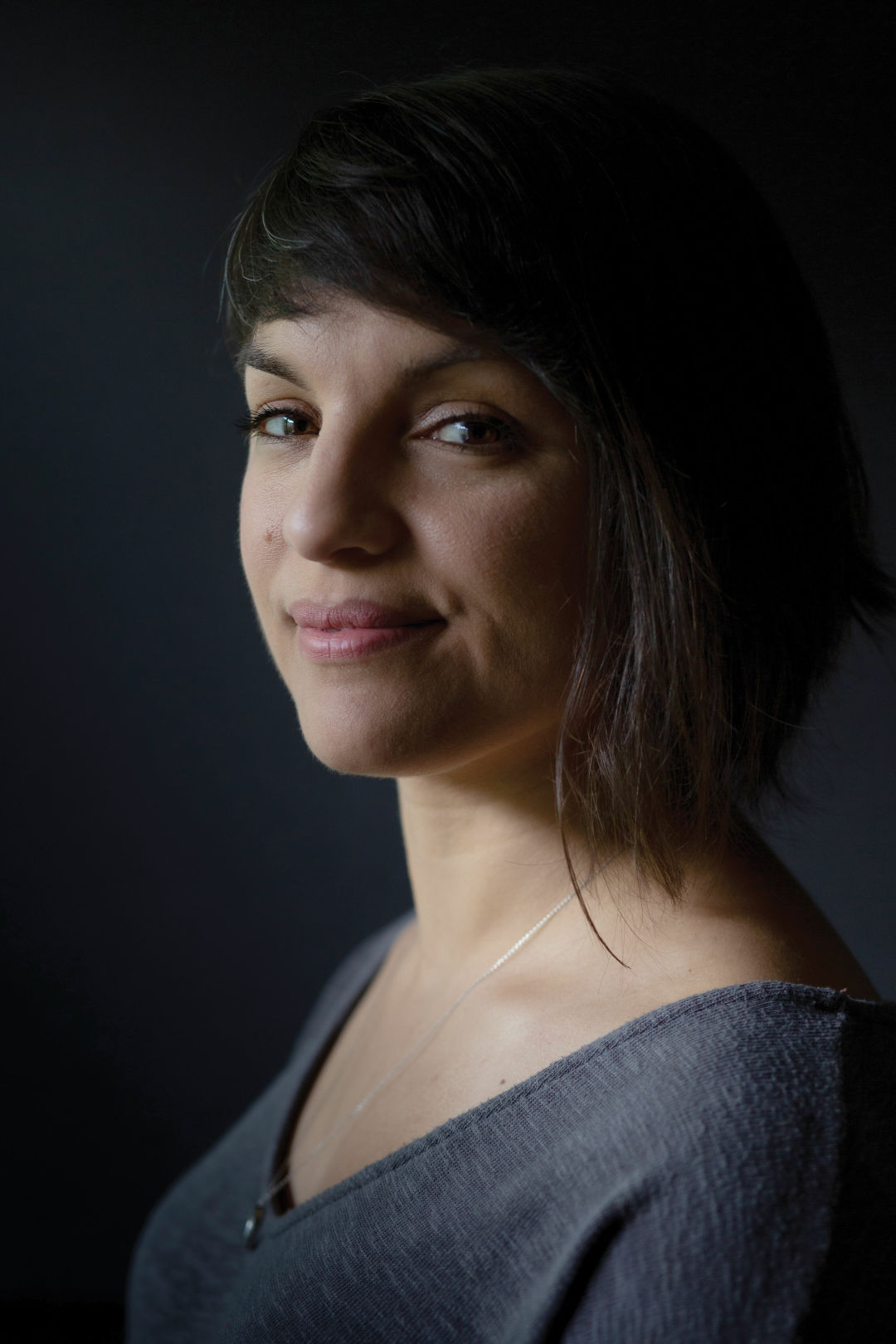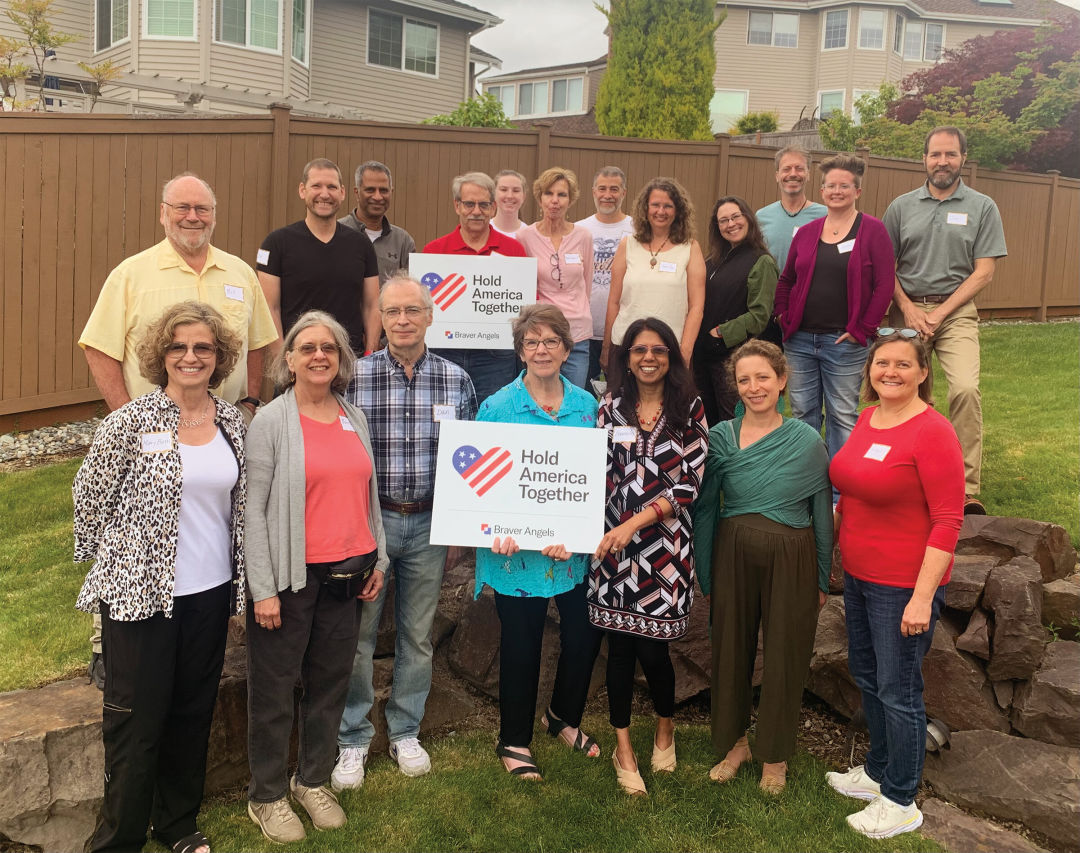Braver Angels Aims to Mend Our Polarized Relationships

Image: The Project Twins
Anxiety gripped Mandi Headrick every second of the six-and-half hours it took to fly from Sea-Tac to Birmingham International Airport to reunite with her sister. Two years had passed since communication broke down with her family. But on that flight in 2021, she carried nearly a lifetime of arguments over her qualms with Christianity, their support for Trump (twice), and the trauma of their hurtful words: “Being queer is a sin” and “being liberal is wrong.”
Growing up gay, progressive, and agnostic in Woodstock, Alabama, she’d never felt fully accepted in a family where heteronormativity, conservatism, and God were elemental to daily life.
She loved her family, and they loved her. But she was tired of persistently defending her reality. After stints in Utah and Alaska, Seattle’s liberal Arcadia called her. Uprooting to the Left Coast didn’t sit well with her father. “The first sentence out of his mouth after I moved here was, ‘Have you found a church yet?’” Headrick remembers.
Still, she tried staying in touch with her family. Phone calls with her sister would start genially enough before inevitably ending in screaming, tears, and Headrick’s hands uncontrollably shaking. For her health, it was best to cease any communication other than the most superficial.
Like other transplants from red states and red Washington counties in Seattle, the 31-year-old is swept up in the maelstrom of polarization ravaging our country, morphing family and one-time friends into enemies.
On the eve of midterm elections, nearly 60 percent of right- and left-leaning people alike say they find it increasingly stressful to discuss politics with Americans of differing political viewpoints. A recent study concluded that no other established democracy in at least the past 70 years has been as severely polarized as the United States. And a national survey, following the January 6 insurrection, showed that 46 percent of Americans believed the country was heading toward another civil war.
Seattle has also seen that political divisions can fall between shades of blue. Debates around police defunding and homeless encampments stoked vitriol among Dems last city election cycle and reignited with every last social media post.
Is this epidemic of mutual animosity caused by outrage-peddling algorithms? Politicians profiting off of hate-mongering? A collective fetish for viewpoint confirmation?
Most likely all of the above. But in Headrick’s case, as she boarded that plane to Alabama, she wasn’t sweating the pathology of her family’s polarization.
Instead, she carried with her all the angst, and all the hope, that accompanies a potential remedy.
Equipped with a master’s in athletic training, Headrick opened Home Stretch Seattle in January of 2020 to work the alchemy of turning tightened muscles into supple ones. Her in-home coaching business specializes in functional stretching—the kind of loosening up that can correct postures and treat other ergonomic woes.
Fortunately for Headrick, several loyal clients allowed her to continue making house calls amid the pandemic. Even more fortunate, one was Mónica Guzmán.

Fights with family pushed Mónica Guzmán to probe our political divide.
The Seattle journalist and author of I Never Thought of It That Way champions a “curiosity mindset,” one practiced by a nonprofit bent on depolarizing the country. Braver Angels, founded after the 2016 presidential election, convenes Americans of all political stripes to foster dialogue, understanding, and civility around highly contentious issues facing our nation, from gun control to race relations. “I don’t think folks necessarily know that it’s possible to have respectful conversations where you find common ground with people across political divides,” says Mary Beth Stibbins, co-chair of the Western Washington Alliance of Braver Angels.
Attempting to reunify the American “household,” the organization uses a family counseling framework to locate common values, eliminate presumptive stereotypes, and prioritize curiosity over judgment. Its depolarization workshops, moderated debates, monthly meetings, book clubs, and film series span 77 nationwide chapters, including two in Washington state.
Guzmán, who’s also the director of digital and storytelling with Braver Angels, has heard several flippant dismissals of her book as “how to talk to fascists.” The visceral reaction and summoning of extreme stereotypes is common. “With Roe v. Wade and gun control, things are so high stakes at the moment that the temptation becomes to color everyone with the same brush,” Guzmán says. “Anyone who disagrees with you is a monster.”
The curiosity approach endorsed by Guzmán and Braver Angels replaces judgment and rejoinders like, “Your birth certificate is an apology letter from the condom factory” with: “Tell me more. What makes you think that? What made you form that opinion?” It’s not a plea for centrism, but a bloody-knees-on-asphalt appeal for nuance and consideration of others with different political beliefs.
During training sessions in Guzmán’s Seattle home, Headrick wondered if this philosophy could address her family’s unbending beliefs. She yearned to patch things up with her relatives, one-by-one.
Self-described as curious to her core, Headrick virtually attended Braver Angels functions and ran ideas by Guzmán. She set up a weeklong reconciliation trip with her sister in Alabama’s ivory Gulf Shores to put the techniques to work. She was terrified. “I thought it would go horribly.”
Still, estranged or not, their pasts were entwined. She’d soon find out if she could say the same of their futures.

One of Washington’s two Braver Angels chapters.
Image: courtesy braver angels
Food and the weather.
Before she unpacked in the Airbnb along Alabama’s sun-soaked coast she’d rented for the reunion with her sister, Headrick reminded herself that if things went sideways, they could always revert to discussions about the sogginess of their shrimp and grits or how balmy it was outside. If that didn’t work, a retreat into separate rooms for cooling-
off periods seemed like a good option. Brief phone calls had ended in crying and shouting—what would a week of relentless face-to-face interaction confined in a rental property produce?
Answering that question meant keeping activities lean. Sure, they’d hoof some of the shoreline’s 32 miles or buy groceries from Walmart for tomorrow’s breakfast, but their only agenda was each other. They needed to discover the person that pain, hurt, and fear had masked these past two years.
Her sister’s craving for sibling love and relationship had mirrored her own. Similarly, Headrick had been unsure how to build a bond while being true to herself.
But over the course of that week, Headrick managed to accomplish both. “That was the first time in my personal family history where…I said all the things that I wanted to say without seeking approval from the opposing party.”

Ballot Fix?
Seattle voters could change the way they select candidates in city primaries
if “approval” or “ranked-choice” voting passes this November. Proponents say either method would force politicians to appeal beyond their bases.
They shared perspectives and the glossed-over contents of their lives. They listened, even when they didn’t agree. “Instead of looking for the opposition, I looked for similarities in the narrative, even if we weren’t saying it the same way.”
God had been a narrative that divided them in the past.
The agnostic Headrick and her evangelical sister actively listened to each other’s beliefs. Headrick’s was one of connective energy. Her sister’s was one of a judging but loving deity. By the end of the trip, instead of sparring over something forever inconclusive, they agreed to mull the reasons for the other’s viewpoints, a Braver Angels calling card. “I had to really set that tone, by giving her the same space that I wanted to be given,” says Headrick.
Ironically that space brought them closer. Prompted by the sight of some NCAA volleyball players near where they were staying, her sister asked Headrick, a former University of West Alabama softball player, if she regretted the tattoo of the elephant on her arm with one of its butt cheeks chewed out.
The body art was an ode to her father. Sports had been one of the few things that connected them over the years. He’d offered words of encouragement to the struggling outfielder, asking, “How do you eat your elephant?” He’d respond before she could: “One bite at a time.”
An apt metaphor, the sisters think, for the moment-by-moment pace at which their relationship resumes.




